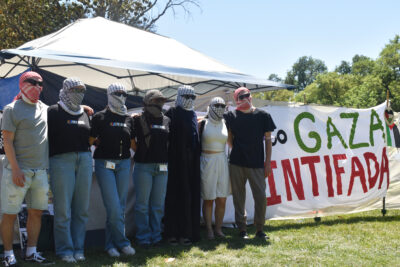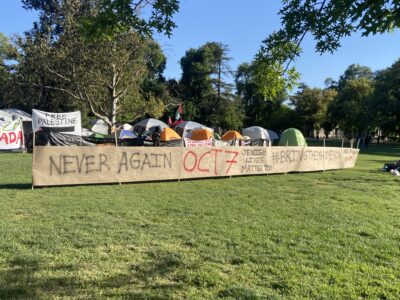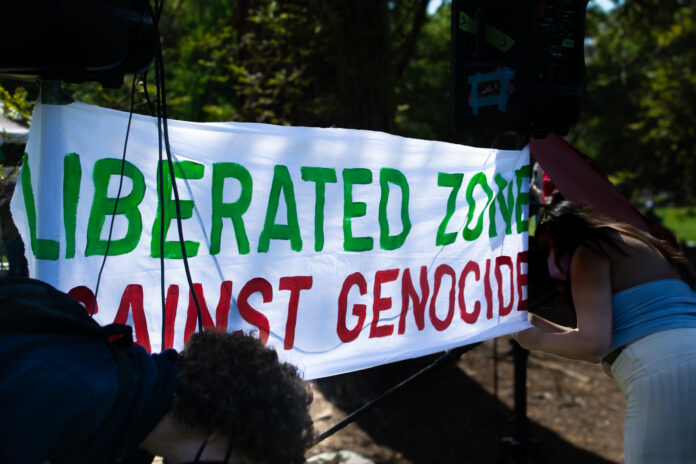After seven weeks, PULP activists completely remove encampment from the Quad
By RIVERS STOUT — campus@theaggie.org
Earlier this summer, Davis Popular University for the Liberation of Palestine (PULP) announced its official decampment after more than 40 days of occupying space on the Memorial Union Quad. Overnight, the encampment completely decamped.
The encampment began with the hopes that the administration would respond to its demands which included: Gary May’s resignation as chancellor or from Leidos — an engineering company with ties to Israel — and the university’s divestment from business and investments in Israel. The group and campus failed to reach an agreement after several meetings.
The press conference which announced the end of the encampment was called on June 19. Stanford McConnehey, UC Davis alum and PULP media liaison, read a speech from what was once the encampment’s check-in desk.
“Despite what Palestinians give to the world, we continue to fail them,” McConnehey said. “We failed them in the 1940’s when our government wholeheartedly backed the invention of the zionist entity, and we [fail] them every day that our government facilitates, aids and abets the occupation, apartheid and genocide carried out in occupied Palestine.”
McConnehey shared the group’s stance on the UC system and their investments and how they affect what a United Nations’ report has labeled as an ”extermination” in Gaza.

“Just like the settler colony in which we sit, the University of California is just as complicit in the genocide of the Palestinian people,” McConnehey said. “The investments of the UC-wide endowment and pension funds and the endowments of each individual UC make the ongoing possible but profitable. People of conscience refuse this complicity being forced upon us in the name of sound investment strategy and fiduciary duty.”
UNIVERSITY RESPONSE
Meetings were held between PULP student leaders and UC Davis Foundation trustees to discuss the University of California’s investments, according to a statement from Chancellor Gary May. May discussed the impact of the conflict in his statement.
“While we decry the loss of innocent life on both sides of this war, including in Israel, we acknowledge the efforts of our students to peacefully protest the humanitarian crisis and staggering loss of life in Gaza, the West Bank and Palestine,” May said. “Protesting immense human suffering and destruction should not be conflated with hatred or intolerance.”
May said in his statement that the campus remains committed to protecting freedom of expression and keeping a safe campus environment moving forward.
“The events of the last several months have put a strain on our campus community,” May said. “However, as we reach this moment, we are grateful to all who have worked hard to maintain a campus where members of our community can peacefully express themselves. We redouble our commitment to providing a safe environment for all, protecting peaceful free expression, and assuring that our mission of teaching, research and public service continues without disruption.”
THE OCTOBER 7TH COALITION

The Davis October 7th Coalition was a group that ran counter-protests to the encampment and tried to raise awareness to the hostages remaining in Hamas captivity. A member of the organization even filed a lawsuit against the campus for its handling of the encampment.
“For the past [seven] weeks, the encampment at UC Davis has been disrupting daily quality of life on campus for Jewish students and faculty, and everyone else not affiliated with the encampment,” the group said via email. “Finally, that is over today but not until after the academic year ended. Though our fight is not over. We filed a waste, fraud and abuse complaint with the State Capitol to reform how UC civil rights offices address complaints of antisemitism so future students can feel safe and protected.”
‘THE WAR OVER HEARTS AND MINDS’
Beshara Kehdi, a Ph.D. candidate and graduate Students for Justice in Palestine [SJP] organizer, said that while a deal wasn’t reached between organizers and the administration, they affected the public opinion.
“The war over hearts and minds has already been won,” Kehdi said. “These encampments have already won. Genocide will not be tolerated, Palesitne will be free. A reckoning is coming and justice will be served from Turtle Island to Palestine.”
McConnehey believes that UC President Michael Drake has a problematic history due to his involvement in the prosecution of the Irvine 11. The Irvine 11 refers to a group of UC Irvine students who interrupted an event featuring Israeli Ambassador Michael Oren in 2010.
“We have to look at Michael Drake’s history at UCI to see exactly how he feels about the Arab, Muslim and Palestinian communities that are beloved by the people of conscience at the UC and in California more broadly,” McConnehey said. “Google the Irvine 11 for a history of his involvement as chancellor at UCI around Palestine and the punitive measures he took to punish people for speaking out.”
McConnehey shared that the University of California had the opportunity to engage in good faith with encampment activists but failed to engage with their demands of divestment.
“When people feel marginalized, when they feel unheard, when they feel like they’re taking every single form of action that they are supposed to take in regards of an issue, especially when that issue is one as clear as an ongoing genocide, you cant really predict what people are going to do when they feel like the people in control of the system thats forcing complicity onto them isn’t listening, or isn’t changing direction,” McConnehey said.
Written by: Rivers Stout — campus@theaggie.org











